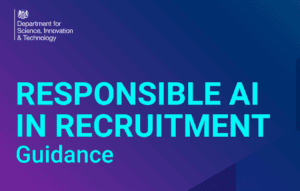In today’s fast-paced business landscape, the management consulting sector is in a constant race to attract top-tier talent. With the pressure to deliver immediate value for clients, employers are always seeking more efficient ways to identify and secure the best consultants.
Enter AI, the new frontier in recruitment, poised to revolutionise the way we hire.
But is AI all it’s cracked up to be, or is it just another overhyped trend? Let’s explore how management consultancy employers can practically apply AI in recruitment to save time, enhance candidate experience, and make more informed hiring decisions.
The Reality Behind AI Hype
There’s no shortage of buzz surrounding AI in recruitment. Every week, new tools claim to revolutionise the hiring process. However, not all of these features are truly AI. For example, many established software solutions rely on traditional methods like keyword matching and Boolean logic—hardly cutting-edge technology. The real risk here is getting swept up in AI excitement, only to make poor decisions or, conversely, become paralysed by indecision.
That said, AI, when used effectively, can offer tangible benefits to recruitment processes. It doesn’t need to be the latest innovation to make a real difference in your firm’s hiring strategy. The key is focusing on a few simple yet powerful applications that can streamline your recruitment efforts today.
Key Considerations for Implementing AI in Recruitment
Before you dive into AI-driven recruitment, it’s important to weigh several factors:
1. Cost and Time
Technology tools can save time, but they also require investment—both in terms of money and employee hours.
2. Effectiveness
Whether your solution is affordable or expensive, its ultimate value comes down to whether it delivers quality hires.
3. Candidate Experience
Every interaction, whether with successful or unsuccessful candidates, should leave a positive impression. A smooth process reflects well on your brand and turns candidates—even those you don’t hire—into ambassadors for your firm.
Getting Started: Small Firms vs. Large Firms
If your consultancy is on the smaller side, hiring fewer than five people per year, you won’t need extensive AI integration. A combination of email, spreadsheets, and perhaps a basic recruitment tool will suffice.
However, larger firms managing multiple vacancies or networks of freelancers may benefit significantly from using an Applicant Tracking System (ATS) with AI features.
For smaller firms, tools like Teamtailor and BreezyHR offer straightforward options with some AI integration. Larger firms might consider more robust solutions like Greenhouse or Transformify, which include advanced candidate matching and filtering.
Harnessing AI Tools for Recruitment
Assuming you’re familiar with the basics of AI, including good quality “prompts”, tools like ChatGPT can provide real value when it comes to the preparation stages of recruitment. Here are just a few of the ways AI can be utilised to save time and improve outcomes:
- Writing Job Descriptions: it can quickly generate compelling job descriptions tailored to your needs.
- Candidate Specifications: it can assist in formulating clear candidate specifications and criteria for selection.
- The Recruitment Process: From job advertisements to suggesting interview structures, AI can streamline many of the time-consuming aspects of recruitment preparation.
Streamlining Candidate Selection and Interviews
Many modern job boards, including LinkedIn, claim AI-powered candidate screening features. While these are often simple keyword matches, some AI solutions can analyse candidate profiles in greater depth, making more sophisticated selections based on multiple data points.
Sites such as Juicebox and hackajob offer advanced AI-driven recruitment options, and video application systems like Hireflix streamline the interview process.
AI can also help by:
- Analysing CVs and associated LinkedIn Profiles: detect discrepancies or misalignments with your candidate specifications.
- Generating Interview Questions: formulate general and candidate-specific interview questions.
- Interview Scheduling and Transcription: schedule interviews, transcribe them, check against the job description and circulate to colleagues.
For more detail on devising an effective interview process see Prism’s guide.
Concerns and Limitations of AI in Recruitment
AI is far from foolproof. Always keep in mind the picture of a “bright intern”. You would ALWAYS check their work before sharing it with other people, whether internal or external and you would ALWAYS make your own decisions on candidates.
AI can be biased itself or can reinforce your own biases. Or make mistakes which you don’t pick up on. That said it can also be a useful tool for challenging your own or others’ preconceptions and can analyse applicants to help the business mitigate such problems.
Many recent posts and blogs have highlighted the pitfalls of using AI to evaluate candidates’ suitability, pointing out real-life examples of limited consensus between various AI platforms’ selections, or between these platforms and an a human reviewer.
Loss of Human Touch
While AI can therefore help you avoid making mistakes with “gut feel”, which might be unconscious bias, it can also stop you hiring candidates who are a 10/10 culture and personal fit but perhaps a 7/10 experience fit. These might be great hires for your business! Or perhaps the (AI graded) weaker “experience” fit overlooks some aspect of experience or personality that is very important.
Also while AI can speed up and can sometimes otherwise enhance the candidate experience many applicants are cynical about most aspects of the recruitment process, especially those involving technology. This is increasing true of AI, which is seen as impersonal, keeping “real humans” at arms length and potentially making flawed decisions.
AI and Candidate Privacy
There can be GDPR and Privacy considerations with the use of applicant information. This is a very complex issue as a glance at the Information Commissioner’s Office (ICO) website will tell you. Here is a helpful Government Guide at 49 pages…. Responsible AI in Recruitment

As a priority a key point is to ensure that ChatGPT or other models don’t retain data. This is complex and evolving so we’d recommend Googling for advice and ensuring the page you visit has a recent posting date. Cynically the current version of ChatGPT has a tab “improve the model for everyone” left “yes” by default: which is how you turn it off!
You should also anonymise all sensitive data that you share with any external AI.
You may wish to consider making public and prominent (for example on your recruitment page or on advertisements) your commitment to candidate privacy.
Finally the business should consider, discuss and agree an approach and policy on how Candidates may use AI in their application. This topic is the subject of another Prism guide.
Actionable Takeaways for Management Consultancy Firms
1. Start Small, Scale Smart
Don’t rush into large-scale AI integration. Begin by automating smaller tasks and expanding as you become more comfortable with the tools.
2. Balance Automation with Human Interaction
Use AI to handle time-consuming administrative tasks, but keep the candidate experience personal.
3. Stay Updated
AI is constantly evolving. Keep informed on the latest tools and updates to stay competitive but don’t panic. You don’t need to be “cutting edge”!
4. Ensure Compliance
Be proactive about privacy regulations and make sure your AI tools comply with GDPR guidelines.
As mentioned there is a bewildering amount of information available: a good starting place for more depth but still manageable information is the job board Indeed: example articles here and here.
The Future of AI in Recruitment
AI is not just a passing fad; it’s here to stay. As technology advances, we can expect AI to become even more integrated into recruitment processes, offering deeper insights and more personalised experiences. However, AI is only as good as the human oversight behind it.
Management consultancy employers that find the right balance between AI-driven efficiency and personal engagement will position themselves to attract top talent and thrive in an increasingly competitive market.
For more information on the job market, or to discuss your hiring or career plans please contact Chris Sale, Managing Director, Prism Executive Recruitment via [email protected]
With thanks to Caroline Boston of New Minds Resourcing for her kind input.



